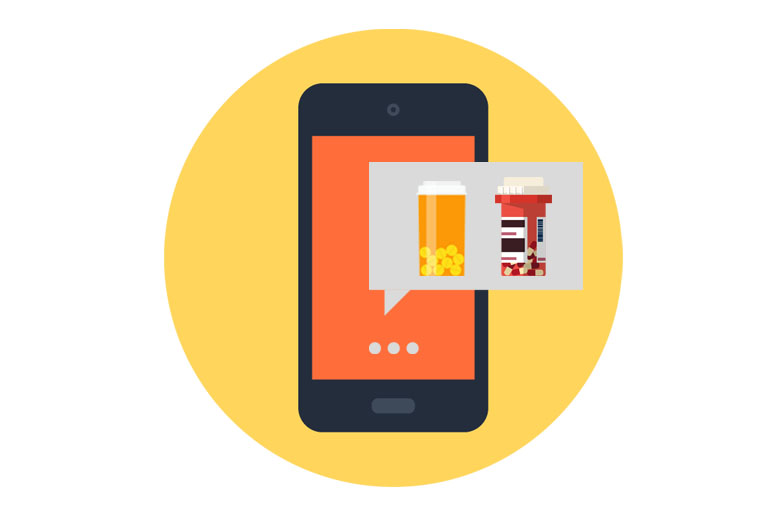A spoonful of sugar may make the medicine go down, but that’s hardly useful if a patient doesn’t remember to take it in the first place.
According to a new analysis, there could be a possible solution: text message reminders sent to patients’ phones from the doctor. Researchers found that texts could push people to do better at adhering to their drug regimens and, along the way, save the health system a fair bit of money.
The paper, published Monday in JAMA Internal Medicine, reviewed data from 16 studies, all of which explored whether mobile telephone text reminders sent to patients made them more likely to take their medicine. In total, the studies included in this meta-analysis tracked the behavior of almost 3,000 chronically ill patients, looking at how well they complied with medication regimens, and found the text messages had an impact.
Across the various studies, patients went from having a 50 percent rate of following through on medication to a nearly 68 percent rate.
On its face, that looks like quite a jump. But readers should view the findings with a degree of caution, the authors noted. They pointed out that several of the studies they examined relied on participants to self-report how faithful they were with their prescription drugs. Since people often misremember or misreport this kind of information, that measure isn’t always the most reliable. In addition, the studies included in the analysis lasted on average about three months, though chronically ill people take their medications for years. Thus, the studies may not have accounted for whether patients eventually experience text message fatigue and consequently paid the reminders less attention. If that is the case, then text messages could initially be effective but, over time, lose their power in helping people take medicine.
“It’s one way to think just sending messages is simple, and people will like it,” said Robby Nieuwlaat, an assistant professor of epidemiology and biostatistics at Canada’s McMaster University in Hamilton, Ontario. “But they can also be irritating at some point if you don’t need it.”
That could be a factor, said Laurie Buis, an assistant professor of family medicine at the University of Michigan, who has also researched the subject. But it’s clear people want such reminders. “There is a lot of consumer demand for these types of interventions.”
The paper also compares studies from a host of countries. Two were based in the United States, but others were conducted in China, Spain and Kenya. Some texted patients every day. Others messaged them every week. Still others used strategies like aligning a text message with timing for when patients should take particular doses. Some sent patients reminders that had been personalized. Others didn’t. Those differences could introduce variables that made the texts more or less effective, or they could have introduced other considerations for which the analysis doesn’t account.
Taking medicine is, of course, important — especially for people with chronic conditions, like diabetes or high blood pressure. Chronically ill people are also often on multiple medications, which can be hard to track and easy to forget about.
That means if text reminders do work, they have “the potential to prevent major clinical events such as heart attacks, strokes and premature death,” study co-author Clara Chow wrote in an email. Chow directs the cardiovascular division of the George Institute for Global Health in Sydney, Australia.
Not taking medicine isn’t just bad for your health — it’s expensive, too. Experts estimate patients not complying with their drug regimens cost the United States between $100 billion and $289 billion each year. If text reminders do prove effective, they could offer an easy, low-cost tool to address that problem.
“Text-message based interventions can be delivered at low-cost, they can be easily scaled with computerized message management systems,” Chow said. “So they are likely to be cost effective in health care.”
But the issue of who pays for the text messaging also raises questions.
Texts are cheap to send, but they still aren’t free, Nieuwlaat said. He wrote a commentary analyzing the study. As researchers further probe how helpful they could be, doctors and patients need to think about who would pay for that kind of service and if it’s worth the investment.
“If it’s on the patient side, it has to be acceptable to the patient — maybe they pay a bit more for the text messaging they receive,” he said. If health systems or doctors subsidize text reminders, they’ll “have to think about whether they think it’s worth investing the money, considering the potential benefit.”
There also needs to be more research to better quantify how influential these messages could be, Nieuwlaat added.
For instance, researchers need to study more than just whether patients remembered taking their medicine, he said. Other questions, such as how often pharmacists refilled prescriptions and whether patients get healthier, would be powerful measures.
Meanwhile, even if text messaging is effective, it addresses only one reason people don’t take their medicine, Buis said. Text messages are a good reminder if you forget something, but people often don’t take medicine for other reasons — they can’t afford the drugs or they dislike particular side effects.
Plus, even if almost 70 percent of respondents ended up taking medicine, that isn’t everyone, she said, adding that a more comprehensive strategy is still necessary.
Though it isn’t enough alone, she said, “text messaging can help move the needle.”







